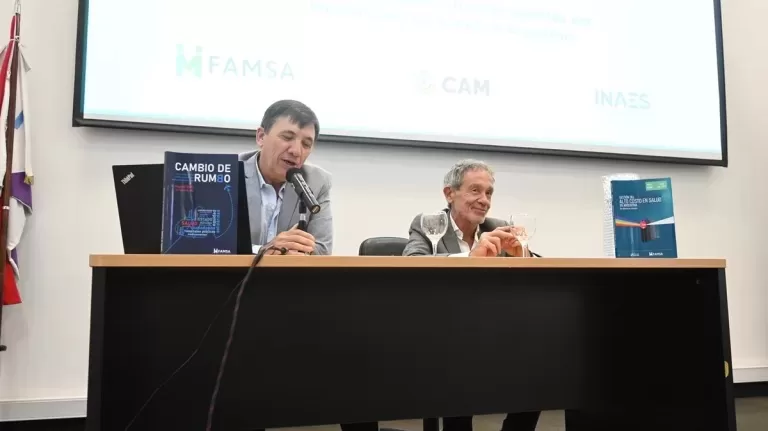“It is time for a discussion to find out from the state what data is needed to think about a sustainable public policy for the health system. There is no efficient use of resources. “Having the tools in place is very important to discuss a change in direction,” federal health authorities have stated.
Last Friday, December 1, 2023, the Federation of Argentine Mutual Health Insurance (FAMSA) presented the Relevar Salud 2023 survey report, on the different central aspects of organizations in the unionized sector and the health system. It was held at the Belgrano 172 headquarters of the National Institute of Associations and Social Economy (INAES).
This survey is part of the research “History, present and possible future of health exchanges in Argentina”, which aims to provide proposals and alternatives for the sector in different health policy scenarios. It was supported by INAES and accompanied by the Argentine Association of Mutual Funds (CAM). In this sense, the presentation was made by the outgoing President of INAES, Alexandre Roig, and attended by Alejandro Russo, President of CAM. The speakers for the day were Dr. Mario Glanc and FAMSA President, Juan A. Pevita.
Among the main ideas, Pivetta expressed: “It is time to have a debate to know from the state what data there are to think about a sustainable public policy for the health system. Resource efficiency does not exist and cannot be achieved without data. “Having the tools is very important to discuss direction change.”
Main data for Relevar Salud
The universe in which the survey was conducted consists of institutions that provide and/or insurance companies for health services stipulated in the Organic Law of Cooperative Societies No. 20,321/73; That is, cooperatives and cooperatives in this sector.
The report highlights: “It is important to know what contribution health mutualities can make to this process, maintaining continuity of care for nearly 3,000,000 people, including members and beneficiaries, who are protected by them, and to contribute from this perspective to the sectoral debate. Which does not It can be postponed.
In the words of Mario Glanc himself, the most notable data from the sample is that “health mutuals concentrate 40% of the country's voluntary insurance beneficiaries.” For Glank, “this means that reciprocity has very great power; “It is an important fact to weigh and indicates that the combined sector is undervalued and underrecognized in the health sector.”
In the health association sector included in the survey, 95% are cooperatives and 5% are cooperatives. Always According to the report, 36% of providers; 46% are insurance companies and the remaining 18% are mixed.
Most entities surveyed provide partial coverage; Only a third provide a mandatory medical plan (PMO) and a smaller portion offers partial coverage and PMO. Another striking fact. 41% have a local scope; 28% at the provincial level; And 15% are national.
One of those responsible for activating the survey was Maria Laura Benitez, who provided details of the work: “This survey was called the Survey for two reasons; First, collecting data in the literal sense, as well as demonstrating the importance of mutuality within the health system. This is clear in that 40% interference.
“As for the experience itself, we had people or institutions that knew how to respond fully and with great preparedness. Benitez noted that in other cases, the importance of raising awareness about data collection was noted.
Finally, Maria Laura expressed: “It is shocking that the young population constitutes the majority among those who choose shared communities. I was also surprised by the importance the mutuality places on primary care. The variety and diversity of services provided by these cooperatives was also surprising, with leisure centres, swimming pools, financial aid, attention to unemployment and a range of non-health issues.
Cooperatives and cooperatives and their proposals
On this particular topic, Alexandre Roig concluded: “The first thing to highlight is that it is a system that has grown, but it is also the only sector that proposes a solution for the informal sector or the popular economy. The second thing is that unionism is one of the few sectors that contribute to the debate and is concerned not only with its sector, but with the entire health system.
In this sense, Juan Piveta said: “The debate about the health system has not yet entered the agenda of major national issues. The quality of health service is increasingly affected. When you have to wait months for an appointment, whether in the public or private sector, lives can be lost. In health, there are things that cannot be postponed, and if you are late or unable to pay all the insurance costs and co-payments, it could cost you your life. “So, it is urgent to discuss the entire health system.”
“Relevar Salud 2017 and 2023 attempted to compensate for these shortcomings,” the report concluded. However, the opportunity is ripe to propose the organic institutionalization of this measure, through the formation of the Observatory for Mutuality in Health, with the coordination of the central regulatory bodies, and with the participation of the federal and federal bodies of the mutual sector. The work carried out, which describes the history, actors and possible future scenarios of the Argentine health system, will be published soon.

“Beeraholic. Friend of animals everywhere. Evil web scholar. Zombie maven.”





:quality(85)/cloudfront-us-east-1.images.arcpublishing.com/infobae/PAGKJH7CJBDBHOF4XHKELQPZV4.jpg)

More Stories
Understandably, foreigners are interested in how we sleep in Spain
The municipal school health program begins this Thursday
Physicists have been trying to reconcile relativity and quantum mechanics for a century. And they have good reason